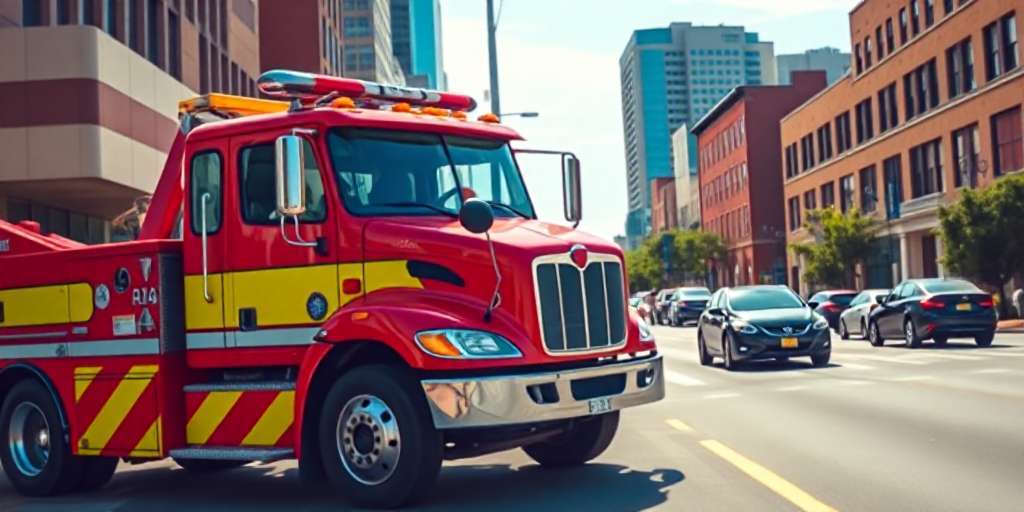Towing Costs
What is a Fair Price for a Tow? Your Guide to Towing Costs
Towing services play a vital role when vehicles break down. Understanding the cost of a tow is essential for vehicle owners. Prices can vary widely based on several factors, including distance, vehicle type, and time of service. This article provides an overview of what constitutes a fair price for towing. It covers pricing structures, average costs, and additional considerations related to insurance and service providers. Familiarity with these aspects helps in making informed decisions during emergencies.

Understanding Towing Costs
Comprehending towing costs is fundamental for vehicle owners, especially during emergencies. Various factors can influence the final price of a tow, making it essential to be informed about the elements that affect these costs.
Factors Affecting Towing Costs
Distance and Fees
The distance a vehicle needs to be towed is one of the primary contributors to the overall cost. Most towing services implement a base fee that covers a specific range of mileage, typically the first few miles. Charges typically start from $50 and can scale higher based on additional miles. For longer distances, the cost can rise significantly, with rates often ranging from $2.50 to $7 per mile thereafter.
Vehicle Type and Condition
The size and condition of the vehicle also play a crucial role in determining the price. Standard sedans incur lower towing fees, while larger vehicles such as SUVs and trucks may attract higher rates due to increased weight and size. Furthermore, if a vehicle is in a difficult position—such as being stuck in mud or a ditch—special equipment may be required, resulting in added fees that can range from $50 to $250.
Time and Availability
The time of day or week can significantly impact towing costs. After-hours towing typically incurs higher charges, often adding a fee that can range from $5 to over $100, depending on the company’s policy. Weekend and holiday services may further escalate costs, as many towing companies consider these peak times.
Average Towing Prices
National Average Cost
The national average cost for a tow is around $109. This figure can serve as a benchmark, but actual prices may vary considerably based on specific circumstances and regions. Local rates can differ significantly, depending on the towing company’s pricing strategy.
Variations Based on Location
Geographical location plays a significant role in determining towing prices. Urban areas generally have higher rates due to increased demand and operational costs for towing companies. Conversely, rural areas may offer lower prices, albeit with possible limitations on availability and service response times.
Pricing Structures of Towing Services
Understanding the pricing structures of towing services is essential for vehicle owners. Various models exist, each influencing the final cost based on the specifics of the tow.
Flat Rate Pricing
Flat rate pricing is a common structure used by many towing companies, particularly for local services. This model allows customers to know the total cost upfront, covering specific mileage and necessary fees.
Local Towing Costs
Local tows typically fall within a price range of $50 to $125. This flat rate often includes services for distances between 5 to 10 miles. Beyond this distance, additional fees may apply, often based on a per-mile charge.
Per Mile Charges
Per mile charges are frequently applied once the base rate is exceeded. This structure allows for flexibility in pricing, especially for longer distances.
Long-Distance Towing
For long-distance tows, the pricing can escalate significantly. Rates can vary widely, but a tow spanning 40 miles or more could range from $125 to $275. For extensive distances, such as 100 miles, the cost might reach up to $600, depending on the towing company and the specifics of the service provided.
Additional Services and Fees
Many towing companies offer additional services that can influence the overall price, especially for complex situations requiring specialized equipment.
After-Hours and Emergency Services
Emergency towing, often needed during after-hours, usually incurs higher costs. Many providers add extra fees to their standard rates for services rendered outside regular business hours, typically anywhere from $5 to over $100. These charges compensate for the availability and readiness of towing personnel during off-peak periods.
Insurance and Towing Coverage
Understanding the nuances of insurance and towing coverage can greatly impact costs during a vehicle breakdown. This section explores what car insurance typically covers regarding towing, enabling informed decisions when facing towing scenarios.
What Car Insurance Covers
Many drivers may not realize that their car insurance policies can include coverage for towing services. However, this coverage varies significantly based on the type of policy and additional features chosen. It’s crucial to review specific terms outlined by the insurance provider.
Roadside Assistance Policies
Roadside assistance is an additional feature that can be included in car insurance policies. This service generally offers help for various emergencies, including towing, flat tire changes, and fuel delivery. Each insurance company has distinct provisions, so understanding what is covered is essential for maximizing benefits.
Insurance Companies Offering Towing
Many major insurance companies provide some form of towing coverage as part of their auto insurance policies. These companies typically offer roadside assistance as an added option or within specialized plans. Examples include:
- State Farm
- Allstate
- Geico
- Progressive
Choosing a provider that aligns with personal needs can help streamline the towing process during emergencies.
How to Use Your Coverage
When needing towing services, policyholders should contact their insurance provider to understand the procedure for using their roadside assistance. This often entails providing the location of the vehicle and the nature of the issue. It’s advisable to keep the insurance card handy, as it may contain essential contact information and policy numbers needed for claims.
Reducing Your Out-of-Pocket Costs
To minimize expenses related to towing, utilizing insurance coverage effectively is key. Knowing what your policy includes can significantly cut costs incurred during breakdowns or accidents. Furthermore, some policies allow for covering a percentage of towing costs, which can provide substantial relief.
Reviewing Your Policy
Regularly reviewing an auto insurance policy can help identify coverage gaps and opportunities for savings. It’s beneficial to discuss with an agent about potential add-ons like roadside assistance. Staying updated on policy changes and adjustments ensures optimal preparedness when urgent towing situations arise.
Choosing a Tow Truck Service
When facing a vehicle breakdown, selecting the right towing service is crucial to ensure a smooth and fair experience. Numerous factors should be considered to find a reliable provider that meets needs effectively.
Identifying Reliable Providers
Finding a dependable towing service can significantly alleviate the stress of vehicle troubles. Researching local companies can provide insights into their reliability and professionalism.
What to Look For in a Towing Company
- Credentials and Licensing: Verify that the towing company is fully licensed and insured. This protects against liabilities and ensures compliance with local regulations.
- Reputation: Look for reviews and testimonials from previous customers. Online platforms and social media can reveal a company’s reputation within the community.
- Response Time: A timely response is essential during emergencies. Evaluate how quickly the service can reach your location.
- Service Range: Confirm that the towing service operates in your area and offers the specific towing type required.
Avoiding Price Gouging
Understanding potential pricing pitfalls is essential when selecting a towing service. Some companies may exploit customers in vulnerable situations.
Tips to Protect the Consumer
- Research Pricing: Before a breakdown occurs, research standard local towing rates to have a benchmark for comparison.
- Ask for Estimates: Always request an upfront estimate to prevent unexpected charges once the service is rendered.
- Read Policies: Review service policies regarding additional charges for after-hours assistance or difficult towing situations.
Towing Service Alternatives
Considering alternatives to traditional towing services can provide additional options for vehicle owners in need. Understanding these alternatives can be financially beneficial.
Benefits of Roadside Assistance Programs
- Membership Advantages: Roadside assistance programs often offer comprehensive services at a fixed annual cost, covering towing and other roadside help.
- Peace of Mind: Membership can offer peace of mind, knowing assistance is available 24/7 without the stress of searching for a service in an emergency.
- Discounted Rates: Many programs provide members with discounted towing services, making it a cost-effective option for frequent travelers.
Frequently Asked Questions
This section addresses common inquiries regarding towing services, prices, and insurance coverage related to towing needs. Understanding these elements can help vehicle owners navigate towing situations more effectively.
How Much Does a Tow Cost?
The cost of towing can vary widely based on several factors. Generally, the national average for a standard tow is around $109. Local towing services typically charge between $50 and $125, accounting for common distance ranges of about 5 to 10 miles. For longer hauls, the expenses can rise significantly, especially when calculated per mile.
- A flat fee for local towing usually includes the first few miles, with additional charges for further distances.
- Long-distance tows, such as those exceeding 40 miles, can total between $125 and $275, depending on the service provider.
Does Insurance Cover Towing?
Many auto insurance policies include towing coverage, often as part of a roadside assistance package. Coverage can vary based on the insurer and the specific policy. Typically, this can help alleviate the out-of-pocket expense during a breakdown.
- Some companies offer roadside assistance at an extra cost, which can cover towing to a repair shop or preferred location.
- It is advisable for policyholders to check their insurance contracts to verify the extent of coverage available for towing services.
What Factors Influence the Price?
Multiple elements can impact towing costs, causing variations in pricing across different scenarios. Key factors include:
- Distance: Charges normally accrue based on the number of miles towed beyond the initial base fee.
- Vehicle Type: The size and weight of the vehicle can lead to increased charges, especially for larger vehicles.
- Condition of the Vehicle: If a vehicle is obstructed or requires special equipment for retrieval, additional fees may apply.
- Time of Day: Towing during nights or holidays often incurs extra costs, sometimes exceeding $100 depending on the company’s policies.
What to Do When You Need a Tow?
Experiencing a breakdown can be stressful, but having a plan can ease the situation. When needing a tow, the following steps can be taken:
- Assess the location and safety of the vehicle to determine whether it is safe to remain inside.
- Contact a reliable towing company and provide them with all necessary details, including your location and vehicle type.
- If insurance coverage is available, inquire about using it to minimize out-of-pocket expenses during the process.
- Remain with the vehicle, if safe, until help arrives to provide assistance if needed.


